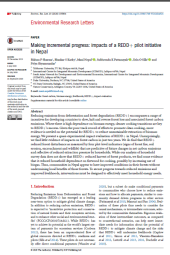Making Incremental Progress: Impacts of a REDD+ Pilot Initiative in Nepal
Summary
The authors of this paper discussed Reducing emissions from deforestation and forest degradation (REDD+) aims to incentivize developing countries to address forest loss and associated carbon emissions. Clean cooking transitions are crucial for REDD+'s success, especially where biomass energy dependence is high. However, more evidence is needed regarding REDD+'s potential to reduce unsustainable biomass extraction. In a quasi-experimental impact evaluation in Nepal, little evidence of forest carbon impacts was found in just two years. Nevertheless, REDD+ did reduce forest disturbance indicated by plot-level indicators such as forest fires, soil erosion, encroachment, and wildlife disturbance, reflecting reduced extraction pressure by households. While the study did not show a decrease in forest product harvest, it suggested a potential reduction in household reliance on firewood through increased biogas usage for cooking. This indicates improved forest conditions in Nepal's communities without undermining local benefits. To ensure progress in emission reduction and livelihood improvement, interventions should effectively meet household energy needs.
Categories:
Research Paper
Writer:
Sharma et. al.
Publisher:
IOP Publishing
Published Year:
2020
